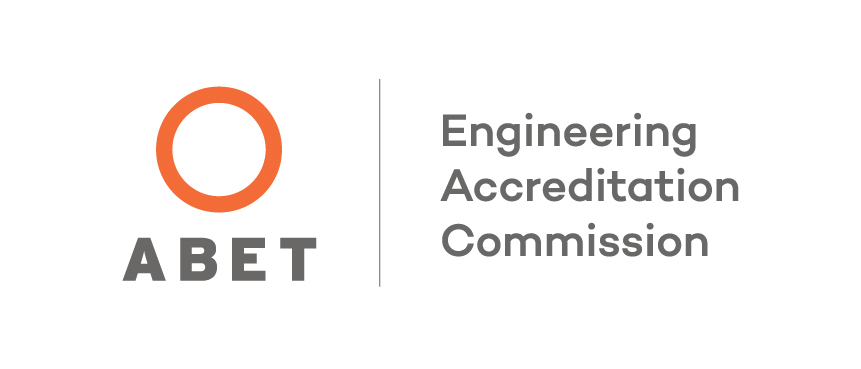Support Page Content
Accreditation & Assessment
The mission, goals, program educational objectives, and student learning outcomes, along with enrollment and graduation information of the Bachelor Science degree program in Civil Engineering (BSCE) are provided below.
Mission: The mission of the BSCE is to provide an outstanding, practice-oriented education in civil engineering.
Goal: The goal of the program is to educate students in an inspirational environment, enabling them to begin their professional careers as competent and thoughtful civil engineers.
If you have any questions, please contact Dr. Saad Merayyan, Civil Engineering Department Chair, at (916) 278-3886.
Accreditation
 The BSCE program is accredited by the Engineering Accreditation Commission (EAC) of ABET.
The BSCE program is accredited by the Engineering Accreditation Commission (EAC) of ABET.
Program Educational Objectives
Program educational objectives are broad statements that describe what graduates are expected to attain within a few years of graduation. The objectives of this program are to prepare graduates to --
- ethically apply their hands-on, practice-oriented civil engineering education to succeed professionally;
- engage in lifelong learning through graduate education, professional development, and/or active involvement in professional organizations; and
- communicate effectively on multi-disciplinary teams to address diverse challenges, creating solutions that serve the general public.
The program educational objectives are consistent with the University Mission, which is: "As California's capital university, Sacramento State transforms lives by preparing students to lead, serve, and succeed." By preparing students to "ethically apply their hands-on, practice-oriented civil engineering education to succeed professionally," the program offers individuals the opportunity to realize their highest professional aspirations. This professional success is assured to continue by preparing students to "engage in lifelong learning through graduate education, professional development, and/or active involvement in professional organizations". Through a contemporary civil engineering education that stimulates students to "communicate effectively on multi-disciplinary teams to address diverse challenges, creating solutions that serve the general public", the program provides an incredible opportunity for a career that provides an invaluable service to society.
Student Learning Outcomes
Student learning outcomes describe what students are expected to know and be able to do by the time of graduation. These outcomes relate to the skills, knowledge, and behaviors that students acquire as they progress through the program. The student learning outcomes required by ABET and assessed in Civil Engineering are:
- An ability to identify, formulate, and solve complex engineering problems by applying principles of engineering, science, and mathematics.
- An ability to apply engineering design to produce solutions that meet specified needs with consideration of public health, safety, and welfare, as well as global, cultural, social, environmental, and economic factors.
- An ability to communicate effectively with a range of audiences.
- An ability to recognize ethical and professional responsibilities in engineering situations and make informed judgments, which must consider the impact of engineering solutions in global, economic, environmental, and societal contexts.
- An ability to function effectively on a team whose members together provide leadership, create a collaborative and inclusive environment, establish goals, plan tasks, and meet objectives.
- An ability to develop and conduct appropriate experimentation, analyze and interpret data, and use engineering judgment to draw conclusions.
- An ability to acquire and apply new knowledge as needed, using appropriate learning strategies.
Enrollment and Graduation Information
The tables below shows the most recent enrollment and graduation data compiled by the Office of Institutional Research (OIR).
CE Enrollment
| Cohort Entering Year | 2009 | 2010 | 2011 | 2012 | 2013 | 2014 | 2015 | 2016 | 2017 | 2018 | 2019 | 2020 |
|---|---|---|---|---|---|---|---|---|---|---|---|---|
| Undergraduate Students | 655 | 683 | 666 | 712 | 677 | 678 | 696 | 734 | 754 | 781 | 816 | 798 |
| Graduate Students | 53 | 54 | 83 | 50 | 63 | 58 | 70 | 76 | 71 | 67 | 51 | 60 |
| Total | 708 | 737 | 749 | 762 | 740 | 736 | 766 | 810 | 825 | 848 | 867 | 858 |
CE Degrees Conferred
| Academic Year | 2009-10 | 2010-11 | 2011-12 | 2012-13 | 2013-14 | 2014-15 | 2015-16 | 2016-17 | 2017-18 | 2018-19 | 2019-20 | 2020-21 |
|---|---|---|---|---|---|---|---|---|---|---|---|---|
| Undergraduate Students | 94 | 101 | 73 | 119 | 113 | 93 | 95 | 133 | 134 | 134 | 186 | |
| Graduate Students | 8 | 11 | 13 | 18 | 27 | 17 | 13 | 19 | 17 | 24 | 23 | |
| Total | 102 | 112 | 86 | 137 | 140 | 110 | 108 | 152 | 151 | 158 | 209 |